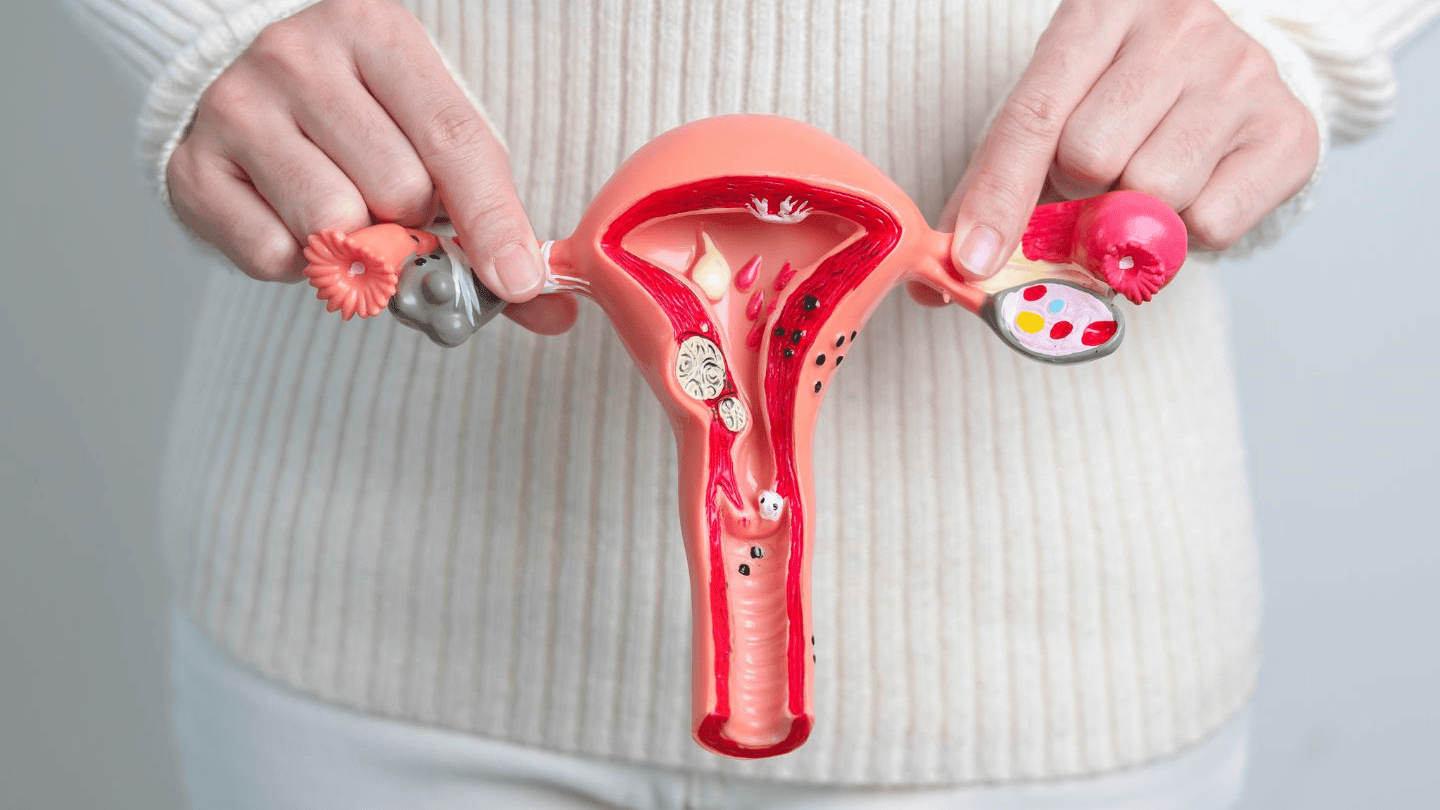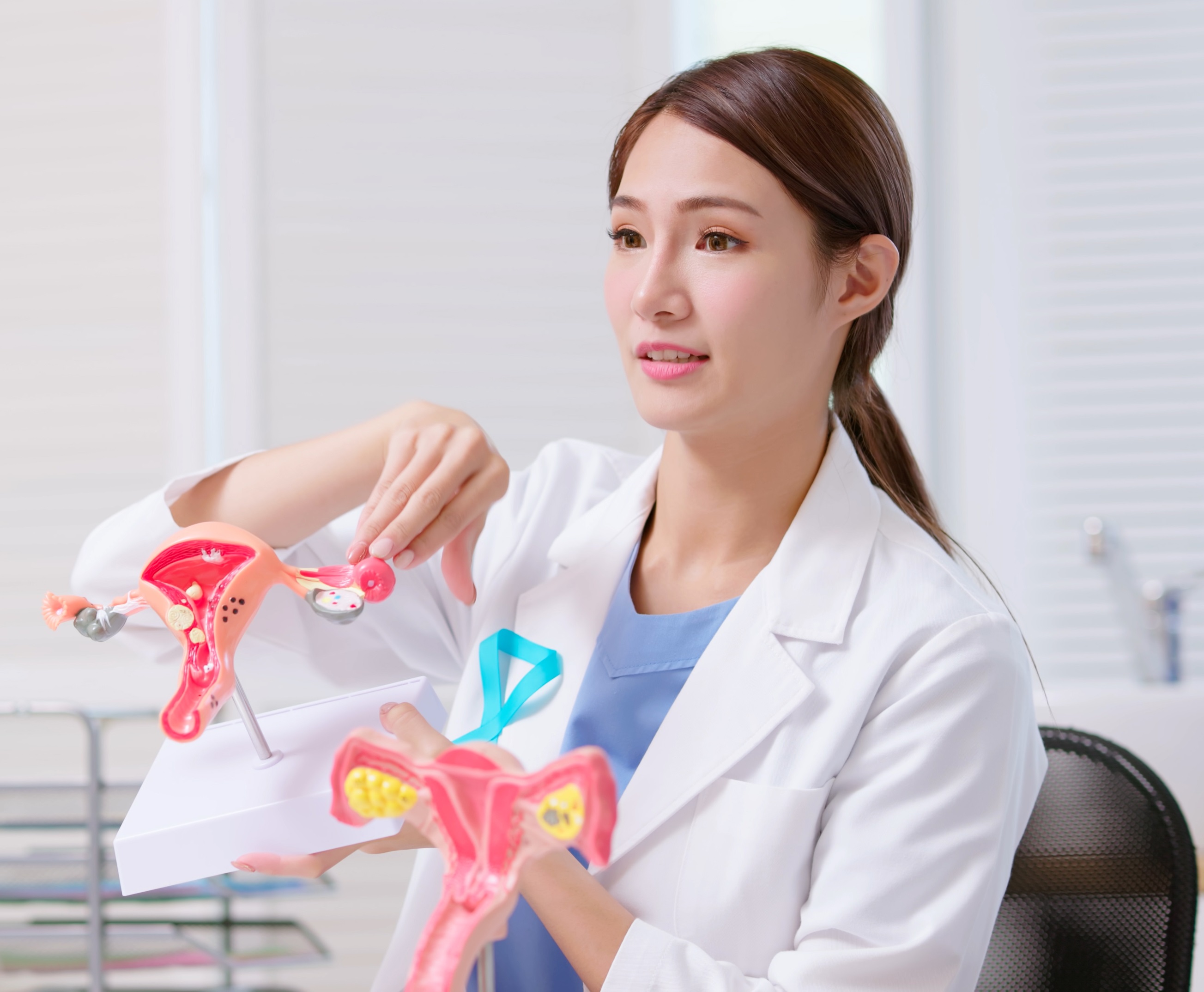Polycystic Ovary Syndrome (PCOS) is the most common hormonal disorder affecting women of reproductive age in Singapore, impacting approximately 10-15% of women. Despite its prevalence, PCOS remains underdiagnosed and often misunderstood. Early diagnosis and comprehensive management are crucial for preventing long-term health complications including infertility, diabetes, and cardiovascular disease.
What is polycystic ovary syndrome (PCOS)?
PCOS is a complex hormonal disorder characterised by an imbalance in reproductive hormones, leading to various symptoms and potential health risks. The condition affects the ovaries, which are responsible for producing eggs and hormones such as oestrogen and progesterone.
What is the difference between polycystic ovaries (PCO) and PCOS?
While the terms sound similar, they describe two different things.
Polycystic ovaries (PCO) simply describe how the ovaries look on an ultrasound scan. In this case, the ovaries may be slightly larger and contain more small fluid-filled follicles than usual. These follicles hold immature eggs and are a normal part of the reproductive cycle. Many women — roughly one in five — have ovaries that appear this way, even if their hormone levels and menstrual cycles are completely normal.
Polycystic ovary syndrome (PCOS), however, is a hormonal condition rather than just an ultrasound finding. Women with PCOS may experience symptoms such as irregular or missed periods, acne, unwanted hair growth, or challenges with weight and fertility. While some women with PCOS have ovaries that look polycystic, not everyone with PCO has PCOS.

What are the symptoms of PCOS?
Polycystic Ovary Syndrome (PCOS) can show up in different ways, and not every woman experiences the same symptoms or to the same degree. The most common include:
Irregular or missed periods:
PCOS often disrupts ovulation, leading to irregular menstrual cycles. Periods may be infrequent, prolonged, or sometimes stop altogether.
Difficulty conceiving:
Because ovulation may not occur regularly, some women find it harder to get pregnant. PCOS is one of the most common, yet treatable, causes of fertility challenges.
Signs of higher androgen levels (hyperandrogenism):
Excess male hormones can cause symptoms such as acne, oily skin, excessive hair growth on the face, chest, or abdomen (hirsutism), and thinning scalp hair or male-pattern baldness.
Polycystic-appearing ovaries:
A pcos ultrasound may show ovaries that are slightly enlarged and contain multiple small follicles—often described as a “string of pearls.” These tiny follicles are immature eggs that haven’t been released during ovulation.
Weight and metabolic changes:
Many women with PCOS experience weight gain or find it difficult to lose weight. Insulin resistance can also develop, increasing the risk of type 2 diabetes and other metabolic issues.
Emotional and mental health effects:
Living with PCOS can sometimes lead to mood swings, anxiety, or low self-esteem, especially when physical symptoms affect confidence or daily life.
If you suspect you have PCOS or are struggling with symptoms, schedule an appointment with Thomson Women's Clinic. Our specialists can confirm your diagnosis, create a tailored treatment plan, and support you in managing your hormonal health.
What are the causes of PCOS?
The exact cause of PCOS is still not fully understood, but research suggests that several interrelated factors contribute to its development:
Genetic predisposition:
PCOS often runs in families. If your mother, sister, or other close relatives have the condition, your likelihood of developing PCOS increases, indicating a strong genetic component.
Hormonal imbalance:
Women with PCOS typically have higher levels of androgens (male hormones) and may experience insulin resistance. These hormonal disruptions interfere with normal ovulation and can lead to the development of multiple small cysts in the ovaries.
Insulin resistance:
When the body’s cells do not respond effectively to insulin, blood sugar levels rise. In response, the body produces more insulin, which can stimulate the ovaries to produce excess androgens — worsening symptoms such as acne, irregular periods, and weight gain.
Lifestyle and environmental factors:
A sedentary lifestyle, poor diet, stress, and being overweight can worsen insulin resistance and hormone imbalances, intensifying PCOS symptoms and complications.
What age group does PCOS affect?
PCOS typically affects women of reproductive age, which spans from puberty to menopause. However, the age range at which PCOS manifests can vary.
Adolescence:
PCOS can occur in teenage girls, often presenting shortly after the onset of menstruation with symptoms like irregular cycles, acne, and excessive hair growth.
Reproductive age:
PCOS is most commonly diagnosed in women in their 20s and 30s, during their prime reproductive years, often due to fertility concerns or other PCOS-related symptoms.
Perimenopause:
PCOS can persist into the period before menopause, potentially worsening symptoms like irregular bleeding and insulin resistance.
Postmenopause:
PCOS is less commonly diagnosed postmenopause. However, some women may continue to experience PCOS-related symptoms or metabolic issues, necessitating ongoing management and monitoring.
It's essential to recognise that PCOS can affect women at different stages of their reproductive lives, and the presentation of symptoms may evolve over time. Early diagnosis and intervention are crucial for managing PCOS effectively and reducing the risk of associated health complications. So, if you experience symptoms suggestive of PCOS, it's recommended that you seek medical evaluation and appropriate care from an obstetrician and gynaecologist.

Our fertility specialists
Loading...
What are the complications of PCOS?
If left untreated, PCOS can lead to several complications:
Infertility:
Ovulatory dysfunction makes conception difficult. However, many women with PCOS can achieve pregnancy with appropriate fertility treatments.
Metabolic syndrome:
Insulin resistance increases the risk of type 2 diabetes and cardiovascular disease.
Endometrial cancer:
Irregular menstrual cycles and unopposed oestrogen exposure raise the risk of endometrial hyperplasia and cancer.
Psychological impact:
PCOS is often associated with anxiety, depression, and poor quality of life due to its physical symptoms and fertility challenges.
How to diagnose PCOS?
Diagnosing Polycystic Ovary Syndrome (PCOS) involves a thorough evaluation of your medical history, physical symptoms, and diagnostic test results. Because PCOS presents differently in each woman, your doctor will assess multiple factors before confirming a diagnosis.
Medical history:
Your doctor will discuss your menstrual patterns, symptoms such as acne or excessive hair growth, changes in weight, and any family history of PCOS or related conditions.
Physical examination:
A physical exam may be performed to look for visible signs of hormonal imbalance, including excess body or facial hair (hirsutism), acne, or weight gain around the abdomen.
Laboratory tests:
Blood tests are used to measure hormone levels such as testosterone, oestrogen, luteinising hormone (LH), follicle-stimulating hormone (FSH), and insulin. These help identify hormonal imbalances linked to PCOS.
Ultrasound scan:
A pelvic ultrasound may be done to examine the ovaries and uterine lining. The presence of multiple small follicles or enlarged ovaries may support a diagnosis of PCOS.
What is the treatment for PCOS?
While there is no single cure for Polycystic Ovary Syndrome (PCOS), its symptoms can be effectively managed through a combination of lifestyle changes, medications, and targeted treatments based on your individual health goals—such as improving menstrual regularity, managing symptoms, or enhancing fertility.
Lifestyle modifications:
Adopting a healthy lifestyle is often the first step in managing PCOS.
Weight management: Even modest weight loss can improve insulin sensitivity, balance hormone levels, and restore regular menstrual cycles.
Healthy diet and exercise: A balanced diet rich in whole grains, lean proteins, and vegetables, combined with regular physical activity, helps regulate blood sugar levels and reduce PCOS-related symptoms.
Medications:
Your doctor may recommend medications to help control specific symptoms of PCOS.
Oral contraceptives: Birth control pills regulate menstrual cycles, reduce androgen levels, and improve symptoms like acne and excess hair growth.
Anti-androgen medications: Drugs such as spironolactone can reduce unwanted hair growth and acne by blocking the effects of male hormones.
Insulin-sensitising agents: Metformin is commonly prescribed to lower insulin levels, support weight loss, and help restore ovulation.
Fertility treatments:
For women trying to conceive, ovulation-inducing medications such as letrozole or clomiphene citrate may be used.
In some cases, assisted reproductive techniques like IVF (in vitro fertilisation) may be recommended if other treatments are unsuccessful.
Psychological support:
PCOS can affect emotional wellbeing. Counselling, support groups, or therapy can help manage stress, anxiety, or depression that may accompany the condition.
PCOS treatment cost in Singapore
The cost of PCOS (Polycystic Ovary Syndrome) treatment in Singapore varies depending on the type of treatment required, the severity of symptoms, and whether you choose public or private healthcare facilities.
Some of the procedures and treatments to help manage PCOS include:
Initial gynaecologist consultation cost around SGD 80-200 for public hospitals (with subsidy), and SGD 150-350 for private clinics
Diagnostic tests:
A comprehensive hormone panel (including LH, FSH, testosterone, glucose, cholesterol) cost around SGD 150-500
Individual hormone tests cost around SGD 30-150 per hormone
Pelvic ultrasound scans cost around SGD 100-300
Medication costs for birth control pills, metformin, or anti-androgen medications typically range from SGD 20 to 150, depending on the specific medications prescribed and whether you opt for generic or branded versions
Nutritionist consultations usually cost from SGD 80 to SGD 200 per session, with package rates available for multiple sessions ranging from SGD 300 to SGD 1,000.
Additional costs to consider
Beyond the primary treatment costs, you should budget for:
- Initial consultations and specialist visits
- Diagnostic tests including ultrasounds, hormonal panels, and glucose tolerance tests
- Medications for managing symptoms (birth control pills, metformin, anti-androgens)
- Fertility treatments if conception is a goal
- Nutritional counseling and lifestyle management support
- Regular follow-up appointments and monitoring tests
- Management of long-term health risks (diabetes screening, cardiovascular monitoring)
How does insurance work for PCOS treatment?
Understanding insurance coverage for PCOS treatment can be complex, as different components may be covered differently:
- Doctor's fees:
- Each specialist has their own panel of insurance providers and coverage arrangements
- Procedures and scans:
- Some procedures like diagnostic imaging or blood tests may be subsidised by the Singapore government or covered under MediShield Life
- Overall treatment costs:
- Your total out-of-pocket expenses will depend on how your insurance plan covers both the doctor's professional fees and the hospital/procedure costs
Fortunately, there are several programmes in Singapore that can help lower the total cost, such as MediSave, MediShield Life, and Integrated Shield Plans. Each of these offers different levels of coverage depending on your eligibility and insurance arrangements.
This price was last updated in June 2025. Treatment costs may have changed since then. For current pricing, detailed insurance coverage information, and personalised financial guidance, contact our medical concierge team.
FAQ
Can PCOS be cured?
PCOS is a chronic condition that currently has no cure. However, appropriate management and lifestyle modifications can help many women control their symptoms and reduce associated health risks.
Can PCOS affect fertility?
Yes, PCOS can make it harder to ovulate, which may delay pregnancy. Many women, however, can conceive with proper treatments such as lifestyle changes, medications, or fertility procedures.
Is PCOS hereditary?
PCOS can run in families. If your mother or sister has PCOS, your risk may be higher, though lifestyle and other factors also play a role.
Who is at risk of PCOS?
PCOS can affect anyone of reproductive age, but you may be at higher risk if you:
- Have a family history of PCOS or diabetes
- Are overweight or have insulin resistance
- Have irregular menstrual cycles or started puberty early
While genetics play a role, lifestyle and hormonal factors also contribute.
How does PCOS affect everyday life?
PCOS can influence different parts of daily life. You may experience:
- Irregular periods or difficulty tracking your cycle
- Acne, excess hair growth, or hair thinning
- Challenges with weight management
- Mood changes or fatigue
- Fertility concerns if you’re trying to conceive
With proper management, most symptoms can be controlled, helping you lead a healthy, active life.
What not to do when you have PCOS?
If you have PCOS, try to avoid:
- Skipping meals or following crash diets
- Leading a sedentary lifestyle
- Ignoring symptoms like irregular periods or weight changes
- Relying on unverified supplements or quick fixes
- Comparing your progress to others — every body responds differently
Instead, focus on balanced nutrition, regular physical activity, stress management, and regular medical follow-ups.
For more information, contact us:
Thomson Specialists (Women's Health)
Thomson Women's Clinic (TWC)
- Novena:
6592 6686 (Call), 8611 8986 (WA) - Bukit Batok:
6569 0668 (Call), 8686 3525 (WA) - Choa Chu Kang:
6893 1227 (Call), 8282 1796 (WA) Jurong:
6262 8588 (Call), 6262 8588 (WA)- Katong (female doctor):
6970 2272 (Call), 8611 9020 (WA) - Punggol:
6243 6843 (Call), 8811 0328 (WA) - Sembawang: 6753 5228
- Sengkang: 6388 8125
- Serangoon (female doctor): 6382 3313
- Tampines: 6857 6266
- Tiong Bahru: 6276 1525
.png%3Fbranch%3Dprod&w=3840&q=75)
